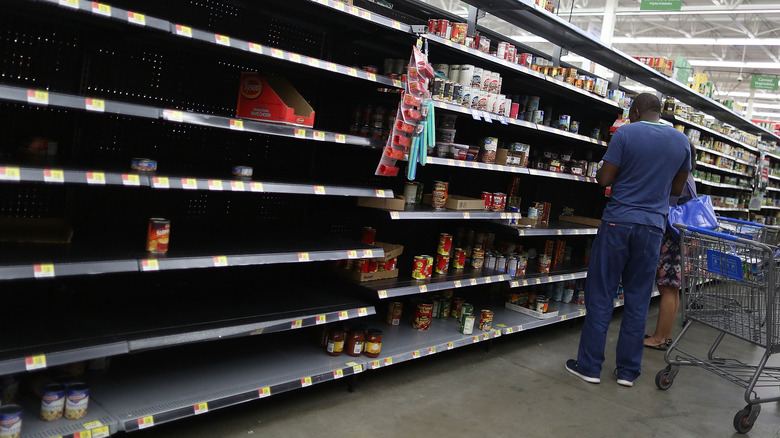Why 2021's 'Everything Shortage' Might Sort Of Be Your Fault
Last week, the seemingly-endless stories of shortages merged into a single concept that defines the feeling of scarcity that has lingered throughout this year: the everything shortage. Except, as Business Insider writes, the word "shortage" implies that this is entirely due to supply. The issue is not just that the pandemic closed some factories, caused some panic buying, or made international shipping more complicated. Rather, demand has grown so much over the last two years that "it's equivalent to about 50 million new Americans joining the economy." So, on top of the previously mentioned problems, there is also the fact that more people want more of the goods that are becoming increasingly more complicated to produce.
A separate article for Business Insider Australia notes that American spending on goods went up by 25.69% between 2019 and 2021, while money spent on services increased by 7.15%. Both of these are taking into account the massive plunge in spending that occurred during the first few months of the pandemic. In other words, demand is now higher in a post-COVID landscape than it was before.
This is tied to news shared by Bloomberg that due to the pandemic, people are now more likely to make a massive changes in their lives, like moving, getting married, or begetting children. So, the focus on the items needed to ground these decisions could lead to even more future shortages.
What can be done?
Many might now want to know what they can do. The short answer is that demand for new commodities needs to drop for a while in order to establish an equilibrium. That would relieve the pressure of demand on the flailing supply chains. However, in a piece that appeared in Government Executive, The Atlantic's Derek Thompson derided the idea that Americans might find a new asceticism: "If you can seriously envision such a world, I envy your gift of imagination."
Business Insider instead spitballs ideas for those who want to refrain from exacerbating the situation. One is to stop buying things. "It would not be great for the economy," Mike Tran, an analyst for RBC Capital Markets, says, "but if people who were stuck at home started spending their money on experiences, instead of belongings, we would see less ships moving in and out of those ports." Experiences differ from goods in that there is not the same issue of supply keeping up with demand. A performance can be repeated for as many times as people buy tickets in a way that manufacturing an air fryer cannot.
For holiday shopping, though, it would be better to buy more locally. Those supply chains are faring better due to having fewer steps and thus fewer chances for things to go wrong. So, you might want to start your gift-buying now to get ahead of any shortages that could occur closer to the holidays.

